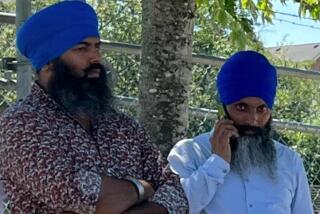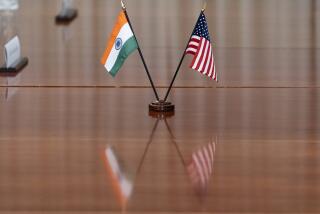Shock and Fear Expressed by O.C.’s Indian Residents
- Share via
Physician Nardinar Singh heard the news from a patient in his Orange office. A colleague at UC Irvine caught AIDS researcher Sudhir Gupta coming out of a meeting, asking him urgently, “Did you hear what happened?”
And a friend found Shubho Shankar, son of the famous sitarist, by phone at home in Garden Grove to pass along word of the day’s events.
The news, spreading quickly Tuesday afternoon, was that former Prime Minister Rajiv Gandhi was dead, killed in a bomb explosion at an election rally in southern India. For many of Orange County’s 15,200 Asian Indians, the assassination was as frightening as it was shocking.
Many of the details of the killing remain unclear. But Orange County residents from India interviewed Tuesday said they are already concerned for the safety and security of loved ones still in their homeland--and for the very stability of the world’s largest democracy.
Even Gandhi’s critics here were taken aback by his death.
“He had lots of enemies. He lived by the sword and he suffered the consequences of his own deeds,” said Harbans Sraon, an Irvine geneticist who has been a leader of the local Sikh religious movement and past president of the Guru Nanak Sikh Temple in Buena Park. “But this still came as quite a surprise to me,” Sraon added.
“I’m totally shocked,” said Shubho Shankar of Garden Grove, a classical sitarist whose father, Ravi, has made a worldwide name for himself through the same vocation.
During his stint as prime minister in the 1980s, Rajiv Gandhi appointed the elder Shankar to a slot in the lower house of India’s parliament, Shubho Shankar said. For all of Gandhi’s “wrong judgments” as prime minister, he did offer a stabilizing force for the country now in his bid for reelection, Shubho Shankar said.
“I just hope it doesn’t come to any kind of ultimate military rule,” he added. “I’m sure there will be chaos now.”
Officials of the Indo American Political Assn. voiced hopes that India would remain calm in the aftermath of the assassination.
“We urge our brethren in India not to settle their scores by violence and appeal to them to keep calm and let the electoral process take its course,” Dr. Parvin Syal, chairman of the association, said in a statement. “We have to watch out for the next 24 hours. If it is calm we think the country will be all right.”
Singh, the Orange physician who came to the United States from India in 1960 and has been active in the local Sikh community, said: “It sounds unbelievable--in that (Gandhi) had enormous security and this was in the south, in an area where you wouldn’t think this was going to happen. . . . This will change the whole election profile.”
Sudhir Gupta, a UC Irvine professor active in AIDS and cancer research, said many political and social questions about the attack must still be answered before the Indian people can hope to explain the death of the latest Gandhi to fall victim to violence.
But no matter what the answers, Gupta said, “at this moment, there will be turmoil. . . . One has to be very, very concerned that we don’t have a major unrest or civil disobedience.”
And Jacob Pandian, an anthropologist at Cal State Fullerton who left India 25 years ago, voiced hope that Gandhi’s death may bring a positive change in an Indian society fractured by cultural, linguistic and religious differences among its people.
“This is a major blow for the Indian system of democracy. . . . But I hope this tragedy forces the leaders to think about this whole question of conflicts between the Muslims and the Hindus and come up with some solutions. Something has to be done--if not, there will be a crisis.”
More to Read
Sign up for Essential California
The most important California stories and recommendations in your inbox every morning.
You may occasionally receive promotional content from the Los Angeles Times.













